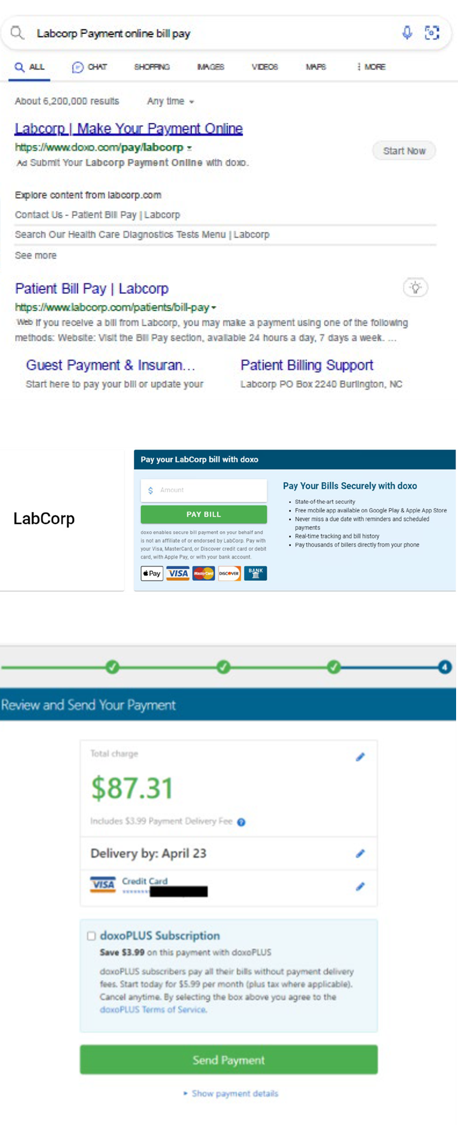It's a recurring trope in caper movies. An unsuspecting person exits an airplane, sees a driver with their name on a sign, and thinks they’re getting transportation to their destination. Of course, the “driver” is really in on the scheme and takes them somewhere without their permission. According to an FTC complaint, bill payment company Doxo has engaged in analogous conduct when consumers searched online for how to pay bills they owed to certain companies. The complaint – which names Doxo, CEO and co-founder Steve Shivers, and Vice President and co-founder Roger Parks – says the defendants use deceptive tactics to trick people into thinking they are in contact with the company in question and then tack millions in junk fees onto consumers’ bills.

When a consumer looks online for information about a company they owe money to, they may think they’re dealing with that business. But according to the FTC, Doxo buys search engine ads that are deceptively designed to suggest a false affiliation with the actual company. The complaint includes example that uses the name of a well-known testing laboratory. Prominently featuring the company’s name, the link says “Make Your Payment Online.” Clicking on that link takes the consumer to a landing page that again features the testing lab’s name in large print and a contrasting bright green PAY BILL button. In a much smaller grey font, it says “doxo enables secure bill payment on your behalf and is not an affiliate of or endorsed by [the testing lab].” Only after providing a substantial amount of personal data – including payment information – the consumer is taken to a page with the heading “Review and Send Your Payment.” In small grey type is the phrase “Includes $3.99 Payment Delivery Fee.”
But according to the FTC, “Unbeknownst to many consumers navigating the above process, they have just been charged by a company that, in the vast majority cases, has no relationship with their biller and is not an official payment channel. Less than 2% of the billers in Doxo’s purported payment ‘network’ have authorized Doxo to receive payments on their behalf.” What’s more, the FTC says that in many instances, consumers could have paid their bills directly to the actual companies without incurring any additional charges, including the “Payment Delivery Fee” that Doxo pocketed.
The FTC alleges that the millions of dollars Doxo collects in hidden fees isn’t the only injury inflicted on consumers. According to the complaint, even though Doxo immediately charges a consumer for payment, in many instances, the company prints a paper check and mails it to the biller – meaning that the consumer’s payment could arrive days or even weeks after the person thinks they’ve paid their bill. Many people discover that Doxo isn’t an official payment channel only after they learn their payment never arrived. According to the FTC, consumers who complained directly to Doxo described in detail the injury they suffered:
They have received warning letters from bill collectors for medical bills they already paid. They have been charged late fees and fines. They have worried their license would be suspended due to non-payment of tolls, and that they would be penalized for non-payment of income or property taxes. They have missed child support payments. They have had their water, gas, internet, and electricity turned off and their car insurance lapse. And they have double paid their bills (once to Doxo, once to the biller) to avoid service cutoffs – all for payments that Doxo promised them would be made “directly” to their billers.
Doxo’s alleged deception didn’t end there. You’ll want to read the complaint for details, but the FTC says Doxo also used misleading tactics to get consumers to sign up for a $5.99 a month subscription program. According to the complaint, until February 2024, Doxo automatically checked the box to sign consumers up when they clicked to read a terms of service document. Once consumers were able to figure out what Doxo was allegedly up to behind their backs, tens of thousands of them complained to the company that they never enrolled in a paid subscription and didn’t authorize Doxo to ding them for recurring charges. In the words of consumers, “I didn’t sign up for this,” “I wasn’t trying to set up anything monthly,” “I’m seeing charges that I didn’t authorize,” “I do not wish to use a service I didn’t sign up for,” and “I didn’t expect that money to be coming out.”
Pending in federal court in Washington State, the five-count complaint alleges violations of the FTC Act, the Gramm-Leach-Bliley Act, and the Restore Online Shoppers’ Confidence Act (ROSCA). Even at this early stage, the filing of the lawsuit demonstrates the FTC’s ongoing commitment to protecting consumers from junk fees, deceptive dark patterns, and misleading practices related to subscription services and recurring payments.

I received a email from Doxo. I had no idea what this was. However I believe they have me paying a 4.99 fee with auto renewal. They obviously had my email.the email
Said important message…
It went on to give info about giving up rights to litigate complaints.thats when I did my research.
Should I be reporting this to someone specific?
In reply to I received a email from Doxo… by Deidra J Morgan
Please report to the FTC at www.ReportFraud.ftc.gov. The information you give goes into a secure database that the FTC and other law enforcement use for investigations. Thank you.